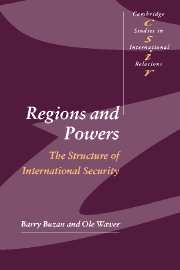Book contents
- Frontmatter
- Contents
- List of illustrations
- Preface
- List of abbreviations
- 1 Patterns of regional security during the Cold War
- 2 Patterns of regional security post-Cold War
- Part I Introduction: developing a regional approach to global security
- Part II Asia
- Part III The Middle East and Africa
- Introduction
- 7 The Middle East: a perennial conflict formation
- 8 Sub-Saharan Africa: security dynamics in a setting of weak and failed states
- Conclusions
- Part IV The Americas
- Part V The Europes
- Part VI Conclusions
- Glossary
- References
- News media
- Index of names
- General Index
- CAMBRIDGE STUDIES IN INTERNATIONAL RELATIONS
8 - Sub-Saharan Africa: security dynamics in a setting of weak and failed states
Published online by Cambridge University Press: 05 December 2009
- Frontmatter
- Contents
- List of illustrations
- Preface
- List of abbreviations
- 1 Patterns of regional security during the Cold War
- 2 Patterns of regional security post-Cold War
- Part I Introduction: developing a regional approach to global security
- Part II Asia
- Part III The Middle East and Africa
- Introduction
- 7 The Middle East: a perennial conflict formation
- 8 Sub-Saharan Africa: security dynamics in a setting of weak and failed states
- Conclusions
- Part IV The Americas
- Part V The Europes
- Part VI Conclusions
- Glossary
- References
- News media
- Index of names
- General Index
- CAMBRIDGE STUDIES IN INTERNATIONAL RELATIONS
Summary
Introduction
Sub-Saharan Africa (hereafter, Africa) has always been a challenge for IR theory, and this is also true for RSCT. The problem is certainly not a lack of security dynamics. A snapshot of Africa during almost any of the previous forty years would show a catalogue of wars, famines, plagues, mass population displacements, ruinous and barbaric political practices, and environmental despoliations. Africa is a pessimist's paradise, a place where the Hobbesian hypothesis that in the absence of a political Leviathan life for individuals will be nasty, brutish, and short seems to be widely manifest in everyday life.
At the centre of the problem lies the postcolonial state, which was the price to be paid for rapid decolonisation. Transplanting European-style states, modes of economic development, and forms of Westphalian international relations to non-European peoples was not easy anywhere. But, while in much of Asia the new states and their system of political economy eventually took root, in most of Africa the transplant has to varying degrees failed. Consequently Africa has retained some of the superficial diplomatic appearance of a Westphalian-style state system over the past forty years, mainly in the continued diplomatic recognition of its states, but it has had rather little of the political, social, or economic reality of functioning states.
- Type
- Chapter
- Information
- Regions and PowersThe Structure of International Security, pp. 219 - 253Publisher: Cambridge University PressPrint publication year: 2003

